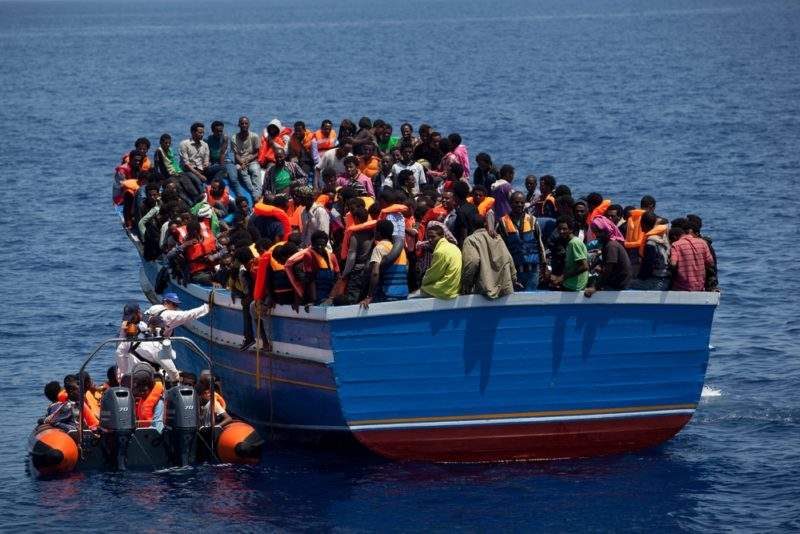
On 10 June, the MV Aquarius approached the shores of Italy packed with more than 600 migrants and refugees on board. It was a journey the ship – run by the NGO’s Médecins Sans Frontières (MSF) and SOS Méditerranée – had done on hundreds of previous occasions in two years of operations in the Mediterranean.
But this time, things were different. Italy’s newly appointed far-right deputy prime minister and interior minister Matteo Salvini said the country would not allow the ship’s passengers to embark. “Italy is done bending over backwards and obeying”, he said on Twitter with the hashtag #closethedoors.
For four days, those on board the aid ship – which included “pregnant women, breastfeeding mothers, babies, burns patients, people who almost drowned,” according to one humanitarian at the scene – were left in limbo until the Spanish Government finally stepped in, offering to let the migrants disembark in Valencia.
Since then, the Government of Italy allowed the 150 migrants to disembark from the ship.
Deep divisions concerning the migrant crisis
The affair underscored the deep divisions facing European Union (EU) countries as they seek solutions to the migrant crisis, which has seen around 1.8 million people pursue refuge and a better life in Europe since 2014, including roughly 37,000 by sea so far in 2018.
It also underscored the hard-line stance taken by Italy’s new populist government, which has made threats to refuse access to all NGO ships in the aftermath of the Aquarius incident.
While Italian foreign minister Enzo Milanesi softened the government’s stance at an EU migration summit in late June, humanitarians remain wary and many in the shipping industry now fear harsh new rules may also affect merchant vessels.
In June, the International Chamber of Shipping (ICS) was forced to release a statement expressing “deep concerns” about the situation, and called on EU member states to urgently address the wider migration crisis.
For decades, the global shipping industry has been obligated to rescue all persons in distress at sea under the International Maritime Organization (IMO) Safety of Life at Sea Convention (SOLAS) and the United Nations Convention on the Law of the Sea (UNCLOS).
“We do not identify who they are, we don’t categorise them as migrants or refugees, we just rescue people in distress,” says John Murray, marine director at the ICS.
Merchant vessels feel the strain
In the absence of NGO ships there is a concern that merchant vessels may increasingly be called upon to conduct their own rescue operations without the training or facilities to cope. Since the Mediterranean migrant crisis escalated in 2015, over 50,000 people have already been rescued by such ships.
“It is fair to say merchant ships are not trained in mass rescue and do not have the equipment specifically designed for this,” says Murray. “Broadly speaking any ship has to have a plan and some equipment to recover people from the sea but it is accepted that depending on the design and size of the ship, that will vary. If the NGO ships are not able to operate it would potentially increase the likelihood that merchant ships would be called into service.”
If merchant vessels are unable to disembark rescued persons promptly, Murray says this could make things even worse. Merchant ships do not have the capabilities to cater for large numbers of potentially traumatised people for significant lengths of time. Profitability of vessels would also be negatively impacted if ships were unnecessarily delayed, hampering maritime trade in the Mediterranean.
“The ship has to be facilitated with disembarkation,” Murray says. “An ordinary merchant ship is not and cannot be seen to be a place of safety. If the reported restrictions on NGO vessels operating and taking people ashore were to be applied to merchant ships it would have a significant impact on the vessel, and the wellbeing of the crew.”
Since the spike in migrant arrivals in 2015, the number of people crossing into Europe has significantly declined. This is due to the 2016 EU-Turkey deal, an increase in border fences in the Balkans, and training given to the Libyan coastguard who are, says Murray, “very effective in intercepting people seeking to cross the Mediterranean in often unseaworthy craft.”
The Libyan gamble: cause for concern?
The training of the Libyan coastguard has met with resistance from human rights groups, however, with Amnesty International claiming European governments are complicit in “a sophisticated system of abuse and exploitation of refugees and migrants” at the hands of the Libyan authorities.
The relationship between Italy and Libya has also triggered concern among merchant vessels, who may be directed by the Libyan authorities to return rescued people to a place that remains unsafe both for migrants and the ship itself.
“It causes concern on two fronts,” says Murray. “Within conventions on refugees there is a focus on non-refoulement – returning asylum seekers to a country where they may be subjected to persecution. If a ship had refugees on board then potentially it would be in breach of those regulations. Second, if 20-30 people are running a ship and they have to tell 300 people ‘we are taking you where you don’t want to go’ there is potentially a safety and security threat to the ship’s crew.”
While the ICS and other organisations lobby European governments to improve the situation, there are concrete steps merchant ships can take to prepare themselves for the event of a mass rescue.
In conjunction with the IMO and UNHCR, the UN’s refugee agency, the ICS has produced advice that lays out a ship’s legal requirements on helping people at sea and guidelines on how to conduct rescue operations.
“The guidelines cover preparation such as planning your own security and how to conduct a large-scale rescue,” says Murray. “This includes embarking, disembarking, medical care and managing people so that vulnerable groups are identified and if need be, separated.”



